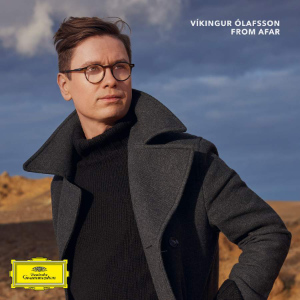
From Afar
Vikingur Ólafsson (pianos)
rec. 2022, Harpa Concert House, Reykjavik
DEUTSCHE GRAMMOPHON 4861681 [2 CDs: 103]
One of the aspects of MusicWeb that distinguishes it from some other classical review publications is that it welcomes second (and occasionally third and fourth) reviews of the same recording. After all, the listening experience is so individual that one person’s view can hardly encompass the entire range of responses. While there are plenty of instances where the multiple reviewers have similar opinions, there are occasions when there is a significant difference of opinion between the reviews. This can serve to resuscitate interest in a criticised recording, or dampen expectations in a highly praised one. Either way, it provides readers with alternative thoughts on the music and/or performance.
It was through David McDade’s review of Vikingur Ólafsson’s 2021 release Mozart and his Contemporaries (review) that I became aware of the Icelander’s extraordinary talents, and tracked down his Bach, Debussy/Rameau and Glass albums. It is not an exaggeration to say that these four albums have transformed my listening habits. Before them, I tended to listen to more orchestral and chamber music, and not so much solo piano. Since the discovery, I would estimate that I’ve listened to one of his albums, in part at the very least, every couple of days.
David McDade, in his review last year of this new release, mainly expressed disappointment, feeling that it was “a misfire”, “too bitty”, “drowning in pedal” and “affected”. This review appeared while my copy was winging its way across the globe to New Zealand, and rather deflated me, though to be honest, I did grimace when I first saw the list of works, among them pieces by Kurtág, Bartók, Adès. So it was with some apprehension that I unwrapped it from its Christmas paper (yes, a private purchase) and inserted the first disc (the programme played on the grand piano) into the CD player.
The first listen assuaged the concerns raised by composers and review. Nothing leapt out as being “difficult”, nor did the obvious pedal concern me. There were some really quite beautiful moments, including the Ave Maria by Ólafsson’s fellow countryman, Sigvaldi Kaldalóns, and to my great surprise, the three folk songs by Bartók. If the Mozart and Bach arrangements were not quite up to the very high standard set by his earlier releases of those composers, I feel that is more to do with the music. My colleague’s major criticisms were reserved for the two Brahms intermezzos, but these were works I barely knew, so came to them with no preconceptions of how they should sound. Having listened to them, I found the only other recordings of the pieces in my collection – by Emil Gilels on DG – and found them a little colourless in comparison.
It is a very different programme to his previous composer-driven albums, much less showy, even introspective. The selections are clearly very personal, borne out by the presence of his wife in a duet in two of the works. In 2021, Ólafsson received an invitation to meet György Kurtág when visiting Budapest for a concert. In his thoughtful booklet notes, Ólafsson tells of the importance of Kurtág’s music to his father, and hence to him. After the meeting between the two, which was supposed to be for fifteen minutes and lasted for more than two hours, Ólafsson decided upon a thank you to Kurtág in the form of this album. So we have seven selections from his Játékok collection of miniatures, plus two Bach arrangements. The Játékok pieces sprinkled through the programme are in fact quite effective “palate cleansers” in between some much more sweet or rich pieces. They are insubstantial, but not inconsequential.
The personal nature of the album is reinforced further by the second version of the programme played on an upright piano, recorded deliberately closely to catch all the extraneous noises from instrument and pianist. I am not really convinced by this, and don’t imagine that I will return to the second disc.
While I may not have this almost meditative programme (when played on the grand piano) on my playlist quite as often as the other albums, I certainly don’t see it as a misfire. But what I do have in common with my colleague is that I too look forward to Ólafsson’s next release.
David Barker
Previous review: David McDade (October 2022)
Help us financially by purchasing from


Contents (on both grand and upright pianos)
Johann Sebastian Bach (1685-1750)
Christe, du Lamm Gottes BWV 619 (arr. György Kurtág)
Robert Schumann (1810-1856)
Study in Canonic Form op. 56/1
Johann Sebastian Bach
Adagio from Sonata for Solo Violin No. 3 in C major BWV 1005 (arr. Víkingur Ólafsson)
György Kurtág (b.1926)
Harmonica (Hommage à Borsody László) (from Játékok, Book 3)
Béla Bartók (1881-1945)
3 Hungarian Folk Songs from Csík Sz. 35a
Johannes Brahms (1833-1897)
Intermezzo in E major op. 116/4
György Kurtág
A Voice in the Distance (from Játékok, Book 5)
Snorri Sigfús Birgisson (b.1954)
Where Life and Death May Dwell (Icelandic folk song)
Johann Sebastian Bach
Allegro moderato from Trio Sonata No. 1 in E flat major BWV 525 (arr. György Kurtág) feat. Halla Oddný Magnúsdóttir
Sigvaldi Kaldalóns (1881-1946)
Ave María (arr. Víkingur Ólafsson)
György Kurtág
Little Chorale (from Játékok, Book 1)
Wolfgang Amadeus Mozart (1756-1791)
Laudate Dominum (arr. Víkingur Ólafsson)
György Kurtág
Sleepily (from Játékok, Book 1)
Robert Schumann
Träumerei op. 15/7
György Kurtág
Flowers We Are (from Játékok, Book 5)
Thomas Adès (b.1971)
The Branch (Az Ág)
György Kurtág
Twittering (from Játékok, Book 1) feat. Halla Oddný Magnúsdóttir
Robert Schumann
Vogel als Prophet op. 82/7
Johannes Brahms
Intermezzo in E minor op. 116/5
György Kurtág
Scraps of a Colinda Melody – Faintly Recollected (Hommage à Farkas Ferenc) (from Játékok, Book 3)


















